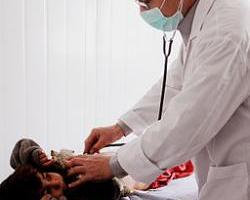The proof of autism might be found in the composition and malfunction in the blood vessels of the brain. A team of scientists recently did a study that brought new light to the causes of autism, which had previously been linked to neurological make-up, rather than the brain. This study identified a new reason for potential therapeutic intervention and treatment options.
The Study and its Results
According to Efrain Azmitia, a professor at NYU’s Department of Biology and a senior author of the study, “Our findings show that those afflicted with autism have unstable blood vessels, disrupting proper delivery of blood to the brain.”
The study was entitled “Persistent Angiogenesis in the Autistic Brain: An Immunocyto-chemical Study of the Post Mortem Cortex, Brainstem and Cerebellum” and it was published in the Journal of Autism and Developmental Disorders.
Other co-authors of the study include Zachary Saccomano an NYU graduate student, Maura Boldrini a research scientist, Mohammed Alzoobaee a NYU undergraduate student and Patricia Whitaker-Azmitia, a professor in the Department of Psychology and director of the Graduate Program in Integrative Neurosciences at Stony Brook University.
Dr. Azmitia states, “In a typical brain, blood vessels are stable, thereby ensuring a stable distribution of blood. Whereas in the autism brain, the cellular structure of blood vessels continually fluctuates, which results in circulation that is fluctuating and ultimately, neurologically limiting.”
In this study, the research team looked at brain tissue from deceased individuals, some from normal brains and some from those who were diagnosed with autism. Under microscopic examination, the researchers were not privy to the nature of the tissue and didn’t know if it came from an autistic brain or normal subject.
Through cellular studies, the team discovered that angiogenesis, the manufacturing of new blood vessels, in autistic brain tissue, did not happen in typical brains. The discovery is significant, because evidence of new blood vessels being created indicates these vessels are always being formed and are in constant flux.
Dr. Boldrini stated, “We found that angiogenesis is correlated with more neurogenesis in other brain diseases, therefore there is the possibility that a change in brain vasculature in autism means a change in cell proliferation or maturation, or survival, and brain plasticity in general. These changes could potentially affect brain networks.”
In closing:
Azmitia observed, “It’s clear that there are changes in brain vascularization in autistic individuals from two to 20 years that are not seen in normally developing individuals past the age of two years. Now that we know this, we have new ways of looking at this disorder and, hopefully with this new knowledge, novel and more effective ways to address it.”




![By gilmae from Sydney, Australia (Flickr) [CC BY-SA 2.0 (http://creativecommons.org/licenses/by-sa/2.0)], via Wikimedia Commons By gilmae from Sydney, Australia (Flickr) [CC BY-SA 2.0 (http://creativecommons.org/licenses/by-sa/2.0)], via Wikimedia Commons](https://www.brainphysics.com/sites/default/files/images/256px-Girls_playing_in_a_small_pool.thumbnail.jpg)
![By Digitalkil (Own work) [Public domain], via Wikimedia Commons By Digitalkil (Own work) [Public domain], via Wikimedia Commons](https://www.brainphysics.com/sites/default/files/images/Human_Semen_in_petri_dish.thumbnail.jpg)
![© Milan Nykodym, Czech Republic [CC BY-SA 2.0 (http://creativecommons.org/licenses/by-sa/2.0)], via Wikimedia Commons © Milan Nykodym, Czech Republic [CC BY-SA 2.0 (http://creativecommons.org/licenses/by-sa/2.0)], via Wikimedia Commons](https://www.brainphysics.com/sites/default/files/images/Pregnant_woman_(4977966488).thumbnail.jpg)
![By Aneta Meszko, Marcin Meszko (Aneta Meszko) [CC BY-SA 3.0 (http://creativecommons.org/licenses/by-sa/3.0)], via Wikimedia Comm By Aneta Meszko, Marcin Meszko (Aneta Meszko) [CC BY-SA 3.0 (http://creativecommons.org/licenses/by-sa/3.0)], via Wikimedia Comm](https://www.brainphysics.com/sites/default/files/images/Nina_skrajny_wcze?niak.jpg)
![By Øyvind Holmstad (Own work) [CC BY-SA 4.0 (http://creativecommons.org/licenses/by-sa/4.0)], via Wikimedia Commons By Øyvind Holmstad (Own work) [CC BY-SA 4.0 (http://creativecommons.org/licenses/by-sa/4.0)], via Wikimedia Commons](https://www.brainphysics.com/sites/default/files/images/Gravid_-_pregnant_woman.thumbnail.jpg)